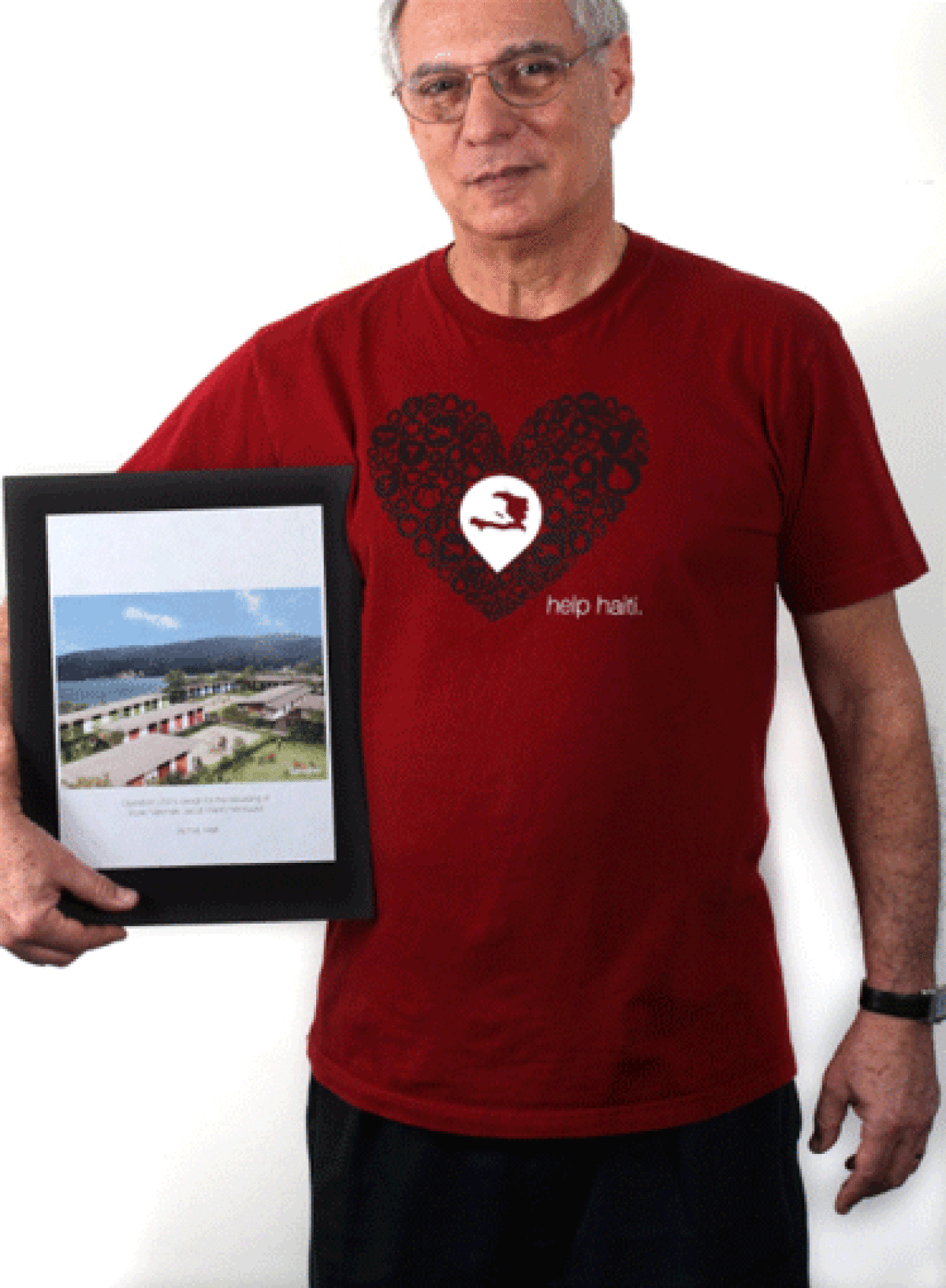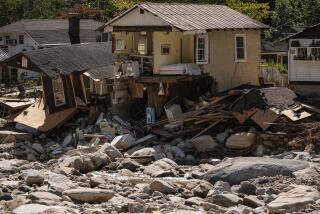Richard M. Walden, Operation USA’s charity buccaneer

- Share via
Almost on impulse, almost 35 years ago, Richard M. Walden and a friend rounded up six tons of relief supplies and a jet to ferry them to Vietnamese boat people in Malaysia. Thus was Operation California — now Operation USA — born. A Times headline soon called him the “charity buccaneer,” a red-tape-slashing contrarian who fretted about the “international web of neglect,” and who still has sharp words for relief efforts unmet and relief agencies that don’t measure up. He has steadfast celebrity supporters, like Julie Andrews, but the advent of social media that let anyone text a few bucks to Lady Gaga’s favorite charity in the middle of a concert has made things harder for brick-and-mortar charities like Operation USA. Walden soldiers on, boldly going where too many charity-come-latelies can only try to go.
You began in 1979 as Operation California; now it’s Operation USA.
Our legal name is Operation California. In 1988 a lot of Texas supporters said, “It sticks in our craw to write checks from Texas to California to benefit Mexico [after the 1985 Mexico City earthquake]. We registered the name Operation Texas. Then we did Operation Heartland for some Midwest floods, all under the Operation California umbrella. Finally Julie Andrews’ publicist said, “You really have to come up with a name you can stick with.”
How does that name resonate abroad?
These days we can’t even wear our T-shirts when we travel abroad. It’s too dangerous, having “Operation USA” and a plane dropping boxes of stuff. It looks like the U.S. is meddling.
There’s so much negativity in places like Pakistan. We’re well enough known in the relief community, but [the name] confuses the hell out of foreign governments. They think we’re U.S. government-funded or the State Department or CIA — it depends on how paranoid they are. Then I run down where we’ve worked and they back off.
[I say,] “Call Fidel, he’ll be happy to provide you with a glowing thing about how helpful we are.”
What sort of dangers in general do you face?
We were not far from Abbottabad, Pakistan. We had an ambulance to evacuate women in complicated labor from the frontier to Islamabad hospitals. It went up with no English-language markings [but] it got stopped, trashed and burned. They didn’t harm the lady in labor and the driver, but that kind of stuff goes on.
How does Operation USA work?
In most cases we look for partners, from U.N. agencies to small, in-country NGOs.
One of our all-time bests is in Jacmel, Haiti, where for $1 million we built a public primary school which has 1,000 kids, no fees, and is a center of community activities, with free architecture from L.A.-based Gensler, money from Honeywell Corp.’s foundation and quake-proofing engineering from Sacramento-based Miyamoto; 100% Haitian-built. Another is a seniors center in Ofunato, Japan, for abandoned seniors in a small port mostly destroyed by the quake. [Again] free architecture, free engineering, free land, all from Japanese partners with money from Honeywell’s foundation.
We [ran] the first U.S. aid to Cambodia after the war, the first to Vietnam, to Ethiopia [in 1984]. Operation USA predates nearly all the major entertainment industry-driven causes by years. In 1980 we had a two-hour prime-time special on the Cambodian famine which featured Julie Andrews, Frank Sinatra, Michael Jackson, Jane Fonda and others.
I can’t say we are still unique, only that we were often the “only Indians in a cowboy town.”
You don’t think much of the way some other relief organizations do business.
Most of the organized relief community is fearful of publicly criticizing programs that don’t work. Philanthropy is a business for too many newer groups who are comfortable with marketing disasters and with government contracting [used] as [an] engine of [a group’s] own growth.
You’ve been especially critical of the American Red Cross. That’s not just sour grapes?
My dad was president of the Culver City Red Cross chapter in the 1950s, and I grew up in a Red Cross family, with nary a negative word spoken about them — until I got an earful from foreign Red Cross personnel about [American] money not getting to them.
The Japan Red Cross and Mexico Red Cross run hospitals, clinics, even whole health systems and aren’t emergency responders. European Red Crosses [do] global emergencies with medical teams and great logistics. [American Red Cross] doesn’t do either of those. Its fundraising far outpaces its programs.
My suggestions [are] that ARC fund more nonprofits at or near the disaster site, that they spend what they collect on that particular disaster and not keep “spare change” in a general account. It was given for a reason and should be restricted to the reason it was donated.
Disaster relief seems to be a growth industry.
You have people who [see] opportunities to raise money, whether they know how to do the particular work or not. The public is motivated, the media helpful, and these guys don’t want to miss out.
We don’t have a large staff, under 10. We don’t take government money because the U.S. embargoes so many countries.
Doesn’t using social media make fundraising easy?
Any fool with larceny in his heart and a clever Web designer can raise a lot of money if they have some sense about what’s getting to people about a particular disaster. Noah’s Wish got millions [for animal rescue] for [Hurricane] Katrina. The attorney general of California made [it turn over] $4 million of it [to government agencies to deliver that animal assistance]. Social media and new media, they could be run by a saint or by a sinner, and the sinners are in the lead right now.
So people don’t check out charities the way they might check out a car they’re buying, or even a food label?
No, they don’t. Charity Navigator or GuideStar — very few people look.
I’ve heard that sometimes so many groups show up in crisis areas that they interfere with relief.
So much [ineffective] money is thrown at something — billions for Haiti and the Asian tsunami. It doesn’t mean new groups shouldn’t get involved. There’s really smart people who made their money and they’re in their 30s and 40s and ready to do humanitarian work.
What about donation fatigue?
There’s an earthquake in India. A guy calls up and says: “My wife saw this story; if I gave you $25,000, what would you do?” I say I’d find an Indian partner and build a small clinic. But then the story goes away. [It’s difficult] sustaining it without what Bill Maher calls “disaster porn.”
How do you address donors concerns that corruption or anti-American sentiment means their help doesn’t get to the people in need?
We make sure our partner is powerful enough to get into the [disaster area] and get the stuff, unmolested by tax and duty and bribes, to the warehouse or hospital. We don’t send food; food is the easiest thing to steal. If you’re sending an X-ray machine or an incubator, it’s pretty tough to divert.
In Sri Lanka, where we’ve worked for 25 years off and on, they don’t like American groups [now] because [Secretary of State] Hillary [Rodham Clinton] complained about the military to the [U.N.] Human Rights Commission. We need to be on the down-low and find partner groups there.
Do you ever have to pay bribes to get goods and people where they need to be?
Usually we don’t pay bribes of any kind. The only quasi-bribe I’ve ever paid was a new issue of Playboy. I will sometimes take two or three, folded over to the articles, and if I get stopped at a roadblock or by some airport official, I’ll say, “I have something for you that’s banned in 150 countries.” Their eyes light up, and it’s “OK, go!”
As I recall, your wife, the actress and comedian Rosanne Katon, was a Playboy centerfold …
I don’t give away her issue!
Follow Patt Morrison on Twitter @pattmlatimes
This interview was edited and excerpted from a taped transcript. An archive of Morrison’s interviews can be found at latimes.com/pattasks.
More to Read
A cure for the common opinion
Get thought-provoking perspectives with our weekly newsletter.
You may occasionally receive promotional content from the Los Angeles Times.











